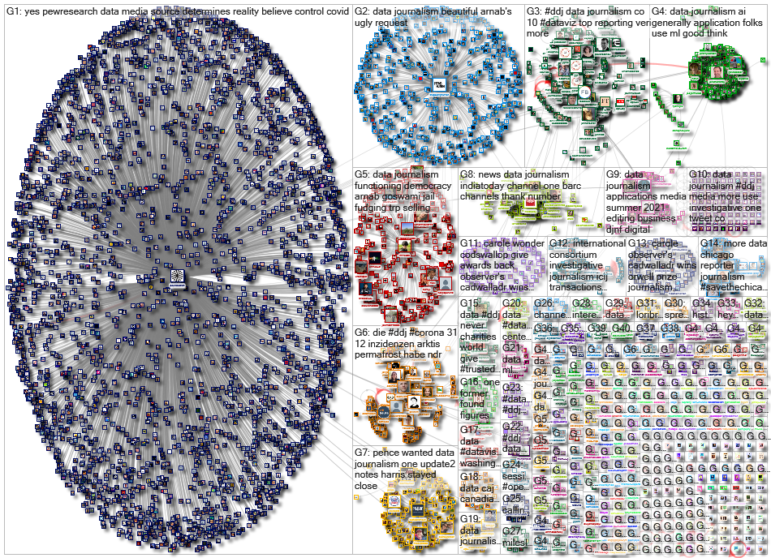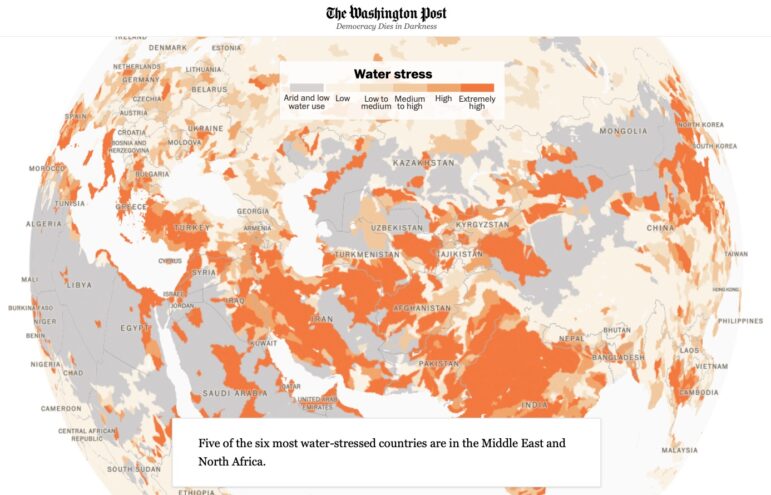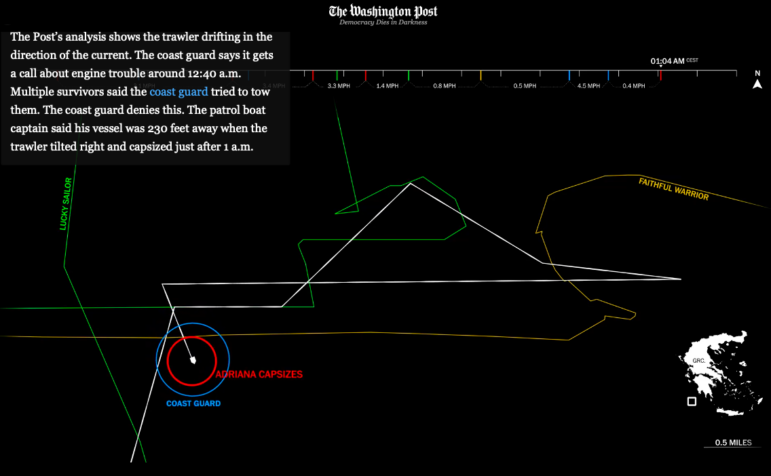

Data Journalism Top 10: A Stunning COVID Data Blunder, Beautiful News, Arctic Fires, Eviction Abuses, Isolating Students
The advancement of technology and availability of complex data tools have been a real boon to society, but utilizing the wrong tools for the job can have dire consequences. Our NodeXL #ddj mapping from October 5 to 11 finds the BBC and The Guardian reporting on a blunder by the English national health authority: It used the wrong Excel file format to store data, resulting in the loss of thousands of COVID-19 test results. Meanwhile, German television news program ZDF heute highlighted how the Arctic has reached record high temperatures this year; DCist and Spotlight DC examined problem evictions; and we find Information is Beautiful offering a daily feed of uplifting news amid the gloom of 2020’s news cycle.
COVID-19 Data Blunder
Nearly 16,000 COVID-19 test results in England went missing recently. The reason: developers used the wrong Microsoft Excel file format to store the data. The BBC explained that England’s public health agency pulled together coronavirus test data collected by commercial firms in CSV files and inserted them into Excel’s old XLS format, which could only handle about 65,000 rows of data rather than the one million-plus rows that Excel is actually capable of. So when the limit was reached, test results were left off. According to The Guardian, the blunder could have resulted in 50,000 potentially infectious people being missed by contact tracers.
Beautiful News
Is the 2020 news cycle getting you down? Check out Beautiful News Daily, a collection of charts celebrating good news, positive trends, uplifting statistics, and facts that are easily missed in the flood of hard news. The project, which covers a wide range of topics including quality of life, clean energy, nature, and animals, was launched in October 2019 by Information is Beautiful founder David McCandless.
https://twitter.com/BobNottm/status/1313437559440244736
COVID-19’s US Foothold via Local Travel
By the time the United States implemented nationwide travel bans and regional lockdowns, the novel coronavirus was already spreading across states for months via local transmissions. The Wall Street Journal interviewed disease detectives and reviewed hundreds of pages of genetic, epidemiological, and computational research to establish how COVID-19 spread in the US (paywall). It found that while the country’s leaders were looking overseas for the cause of new infections, the earliest cases in many states most likely resulted from domestic travel.
Fires in the Arctic
Verkhoyansk, located in Russia’s Arctic region and usually one of the coldest places on Earth, saw temperatures reaching 38 degrees Celsius this summer — the highest temperature ever recorded in the Arctic. More fires also broke out in the region in 2019 and 2020 compared to previous years. German television news program ZDF heute used satellite imagery to illustrate findings by climate researchers and explain the effects of global warming in the area.
Analyzing Evictions
In a nine-month investigation, DCist and Spotlight DC, which are both based in the US capital, found more than 600 eviction cases containing discrepancies that if brought to a judge’s attention, would likely have resulted in the case being dismissed. The team pieced together the evidence by poring through more than 13,000 pages of court records, reviewing hours of security camera footage, and conducting nearly 60 interviews. Journalist Josh Kaplan summarizes the investigation’s findings in this tweet thread.
Mapping a Kyrgyz Family Empire
The Organized Crime and Corruption Reporting Project, Kloop, Radio Azattyk, and Bellingcat jointly investigated a Kyrgyz family’s customs empire and how it used its power to influence important political processes in Kyrgyzstan. See an interactive map of the family’s property, which includes luxury apartments and valuable retail space.
Should We Make Election Forecasts?
Should news outlets stop making election forecasts based on polling data? Nieman Lab’s Joshua Benton examines this question and dives into the complexities of election forecasting models, asking whether they help or confuse voters. Bonus link: Mapbox is organizing a free webinar on visualizing election data and mapping untold stories.
https://twitter.com/gelliottmorris/status/1313921558314971136
Partisan Differences on the Pandemic
A Pew Research Center study finds major partisan gaps when it comes to perceptions of the COVID-19 pandemic, and deep disagreement between Democrats and Republicans on how the US has handled the outbreak. About two-thirds (68%) of Republicans and independents who lean Republican say the country has done about as much as it could to control the outbreak. But only one-in-ten (11%) Democrats and independents who lean Democratic hold that view.
Seclusion in Schools
Two decades ago, the US state of Illinois passed laws intended to protect students from being locked away in rooms as punishment or physically restrained to get them to behave. Although the legislation required schools to document each “isolated timeout” incident in detail, these records are not submitted for review to any state agencies. The Chicago Tribune and ProPublica Illinois filed public records requests to access these documents and created a database with more than 20,000 such incidents. An analysis revealed that a significant number of children were isolated for reasons that violate the law. This investigation just won the Online News Association Award for Investigative Data Journalism.
Vulnerability to COVID-19 in England, Wales
British newspaper, magazine, and digital publisher Reach (formerly known as the Trinity Mirror) created an interactive for residents in England and Wales to see how vulnerable their area is to the coronavirus based on their postcode. Its analysis is based on data on excess deaths and population demographics, plus economic and social factors.
Thanks again to Marc Smith and Harald Meier of Connected Action for gathering the links and graphing them. The Top Ten #ddj list is curated weekly.
 Eunice Au is GIJN’s program manager. Previously, she was a Malaysia correspondent for Singapore’s The Straits Times, and a journalist at the New Straits Times. She has also written for The Sun, Malaysian Today, and Madam Chair.
Eunice Au is GIJN’s program manager. Previously, she was a Malaysia correspondent for Singapore’s The Straits Times, and a journalist at the New Straits Times. She has also written for The Sun, Malaysian Today, and Madam Chair.
For a look at NodeXL’s mapping on #ddj and data journalism on Twitter, check out this map.









